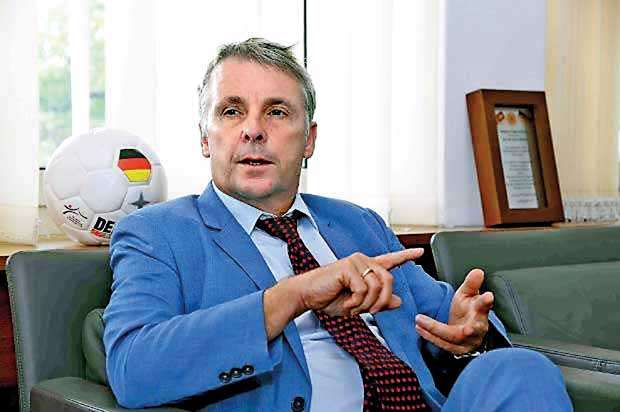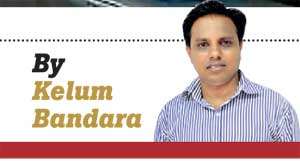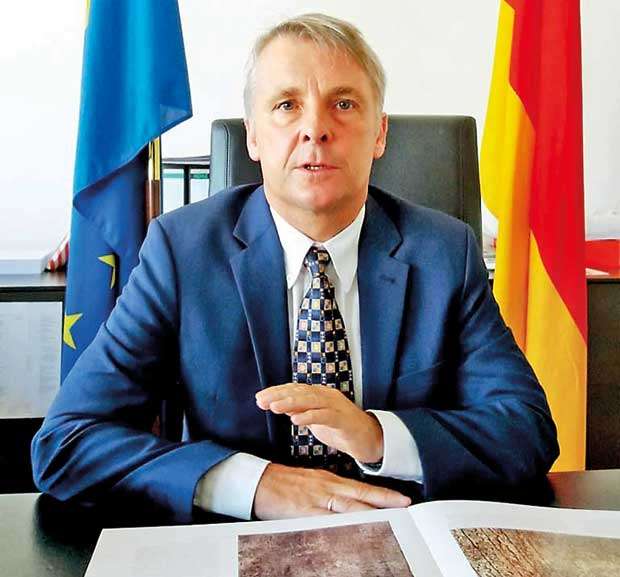23 Nov 2018 - {{hitsCtrl.values.hits}}


We have clearly seen it negatively since last week. I read newspaper reports. There is a cry for help from the leading business chambers. It is really starting to have real economic impacts. That is why they are advocating a speedy solution. From the embassy’s point of view, I see business activities already being effected. High ranking business visits have been cancelled.
I do not want to go into more details. You can call it high ranking business visits that were planned. We expect a parliamentary delegation to arrive early next year. That is now in the balance. Secondly, it is the reputation of Sri Lanka that is suffering. As a trade representative, I myself went to the Asia Pacific Conference of German Business which is held biannually. It was in Jakarta this time. This is an opportunity for us. Then Minister Malik Samarawickrama was to represent Sri Lanka and present it as a place for investment before German CEOs. There were about 1000 German CEOs. That conference was on November 1. Naturally, the then Minister could not come. He was busy here. I was on stage. Instead of being able to sell Sri Lanka, we were posed with questions on what was going on here. Yours is the only country with two Prime Ministers. That is what they said. It was a difficult situation for us. In a nutshell, it was not the opportunity we sought to sell Sri Lanka. It was a wasted opportunity.
Secondly, we opened the German Trade Office last year in Sri Lanka. Sri Lanka is the only country in South Asia, besides India, with a professional trade office. It is a German investment. The German Government and the industries pump in a lot of money there. The present situation puts such investment-long–term and middle term-in doubt.
Everybody talks about Sri Lanka being the hub of South Asia. These are all questions endangering important things for investors.
"Instead of being able to sell Sri Lanka, we were posed with questions on what was going on here. Yours is the only country with two Prime Ministers. That is what they said. It was a difficult situation for us. In a nutshell, it was not the opportunity we sought to sell Sri Lanka. It was a wasted opportunity"
It is quite easy to answer that question. German law prescribes very stringent compliance rules to be followed by German investors. These laws are very strict. None of these allegations ever touched German companies.
I had a phone conference with a German bank. They wanted to come here. I asked them to postpone their visit due to current uncertainty. I had talks with German investors. Because of the present political circumstances, there is a complete paralysis of all the Ministries. German Development law was given to the Health Ministry. That is to build a maternity hospital in Galle. Loan disbursement is delayed. We are also financing a vocational training centre in the south. Everything is put on hold.
In Matara, it is about 11 million Euros. For the development of the hospital, it is 42 million Euros. This is a loan. The delay costs the Sri Lankan tax payers. It is very unfortunate that decisions cannot be taken at this moment. Unfortunately, we have to advise the investors to wait until this situation subsides. Travel advisories by us and other countries have been updated. This also affects tourism.

I already see effects on business activities
High ranking business visit from Germany on hold
In a democracy, elections express will of votes
But, due process has to be followed
We are now talking about the economy. We have already expressed our general concerns either through the embassies of the European Union or through our spokesperson at the press conference in Germany.
We are for the speedy conclusion of this problem. We want everyone to respect the rule of law and due process and transparency. Everybody said the same. In 2017, European Union granted the GSP + trade facility.
Sri Lanka has been given GSP + in return for its commitment to sign 27 international conventions in the field of human rights, good governance, labour rights, environmental protection, the reform of the Prevention of Terrorism Act, the Criminal Code of Procedure. This is commitment by the Government of Sri Lanka. We expect any Government to follow up on this commitment. This is a unilateral trade concession. During the first half of the next year, there will be a monitoring mission checking the progress. That is one of the concerns we have.
I will not venture into hypothetical questions. There is a clear chain of events. EU has given GSP + facility. Sri Lanka has committed to certain obligations. There is a common monitoring process. If the EU sees that there are problems, there will be consultations with the Government. In the past, it was withdrawn. The effects were not positive. It is a unilateral trade concession. In the textile field, those involved know how beneficial it was. For the textile industry, GSP + is a boost. There is a clear policy by the EU that Sri Lanka should follow up on its commitment. If they are not fulfilled, there will be problems.
I do not have a glass wall to look into. Parliament meets. It is an opportunity to end the crisis. The Supreme Court has spoken. Parliament should give its opinion. They should closely work with the executive to find a speedy solution. The situation is really endangering the economic recovery and development of Sri Lanka.
"I do not have a glass wall to look into. Parliament meets. It is an opportunity to end the crisis. The Supreme Court has spoken. Parliament should give its opinion. They should closely work with the executive to find a speedy solution"
That is right. Since you are a lower middle income country, you have been given a five-year period. It should be used to adopt diversified exports. That is why it is important to follow up on the commitments. Of course, it will be over. But, these five years should be well utilised to diversify your economy.
It came to the Maldives last month. The elections are the feat of democracy. In a democracy, elections express the will of voters. The whole process should be done with transparency using the due process while respecting the rule of law. That is what we all accept as people from democratic countries. We hope Parliament will express its opinion through arguments and not by throwing wastepaper baskets. In a democracy, you win by arguments, not by throwing objects.
Today, the focus should be on the effects on the economy.
There are discussions in our Parliament about our development cooperation. The MPs want to know. The situation has effects on our decisions.
It is not clear in what direction the Government is moving. Of course, aid is also dependent on clarity and predictability. There is no clarity whether the new Government has clarity on this project or that project. That has negative effects on cooperation on the economy.
10 Jan 2025 7 minute ago
10 Jan 2025 2 hours ago
10 Jan 2025 2 hours ago
10 Jan 2025 3 hours ago
10 Jan 2025 4 hours ago